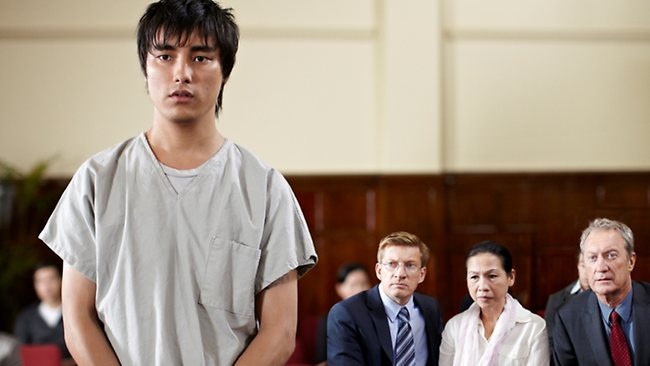The actual memorial service for Van Nguyen took place only a short walk away from where Remy Hii, the actor who depicts the 25-year-old Australian who was hanged for drug trafficking in Singapore in 2005, is talking about what amounts to a highly surreal moment in any actor's life, let alone a novice in his first TV role.
Earlier in the day, the emotional funeral service was filmed. Needless to say, Hii wasn't required on the set for the scene. Though it was his first day off in weeks, an opportunity to rest or prepare, here he is ''witnessing my own death''.
One day earlier, the gruelling scene in which Nguyen says a final goodbye to his mother, brother, friends and his close-knit legal team was filmed. The Singaporean authorities denied Nguyen's mother Kim the right to embrace her son. Instead, they touched hands through a tissue-box-sized hole in a glass screen.
At his request, Hii's mother came from Sydney to watch her 23-year-old son at work. ''I tried to tell her about the scene we were shooting. I got halfway through and started choking up,'' Hii recalls.
The two-part mini-series Better Man marks SBS's return to drama production since East West 101 ended. Written and directed by Khoa Do, who like Van Nguyen came to Australia in the 1980s as a refugee, the drama is based on the actual events leading up to and following his arrest at Changi Airport with close to half a kilogram of heroin.
Sentenced to death, his case initiated a noisy campaign involving human-rights advocates, legal challenges, the media and state and federal governments whose pleas for clemency went unanswered. Nguyen was executed on December 2, 2005.
Despite the publicity the case generated (there was also an absorbing documentary, Just Punishment, in 2006), the circumstances of Nguyen's ill-fated trip to Cambodia to collect the drugs, and his subsequent arrest, ''was a superficially reported story'', Better Man producer Stephen Corvini says. ''It was portrayed without depth or investigation. This is a story about family, and as in most Asian cultures a provider is chosen for each family. Van took this [role] very seriously.
''Kim [Nguyen's mother] was a typical migrant woman who did what she could - she housed, clothed and educated her family, but the fact is she's an unskilled worker working very long hours and Van did what he could.
''When his [twin] brother [Khoa] got into trouble with the police, that was even more responsibility for him. He [Van] was a would-be entrepreneur, a smart, intelligent and popular guy, not without his faults, who took on the responsibilities of the provider very seriously and I think this was never covered in the media. He did it for his family. It's not that he was a would-be drug lord. It was circumstances. He was so naive he didn't know how much money he was going to get for doing this run.
''He was a kid who made a very stupid mistake. Nobody pretended he didn't make that mistake, least of all himself.''
Early in the project's protracted development, Do approached Kim Nguyen. While she declined to be involved, she expressed hope that it would show the true story of her son's life and the futility of capital punishment.
''No one's forgotten how sensitive this story is [for Nguyen's family],'' Corvini says.
Though Hii grew up in very different circumstances to Nguyen, he spent time in the Vietnamese district of Cabramatta in Sydney in preparation for the role, ''learning about that culture, because I felt that's something that needed attention. That's something I wanted to approach respectfully.''
With the help of Do and his wife, Hii learnt Vietnamese dialogue, which is included in the show.

The title, Hii says, refers to Nguyen's transformation in the three years he spent in prison.
Having found strength in religion, ''his concerns weren't for himself'', Hii says. ''He wanted to make sure that everyone else would be OK; that his brother would not feel guilty [and] that he would continue to live a rewarding and fruitful life; that his mother would go on without him; that his friends would smile when they thought of him.''
Creatively, it was a challenging piece to plot, Corvini says.
''We know what the ending is and once our protagonist is incarcerated, we lose him for ostensibly half the series.''
Incongruously, the film United 93 was a model for how to deal with the audience already knowing the outcome to the story.
After Nguyen's imprisonment, the focus of the drama shifts - from Nguyen to Julian McMahon (David Wenham) and Lex Lasry (Bryan Brown), the high-profile Melbourne lawyers who became involved in Nguyen's defence, and Nguyen's friends and family.
A contentious poll in News Ltd tabloids in the lead-up to Van Nguyen's execution suggested that 52 per cent of the public approved it, while 44 per cent were against it.
While Corvini says he would be surprised if many people came forward to say capital punishment is a good thing after watching Better Man, he believes it's important the audience makes up its own mind.
While there is no doubt that the lawyer played by Brown is staunchly against capital punishment, the actor says the story enlightens us about how the world operates rather than advocating for something that's right or wrong.
''It makes you realise that people are connected to families when these things happen,'' he says.
''All you can think about is what happens when the phone call goes to the parents of that child. It can happen to any of us. Got caught with drugs in Singapore? Fell off a building? It makes you stop and think of the tragic things people have to deal with.''
From
here.